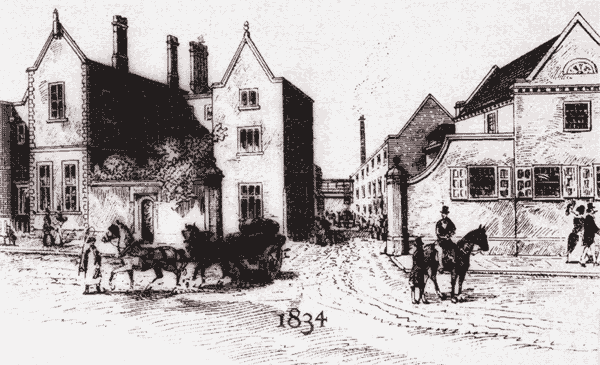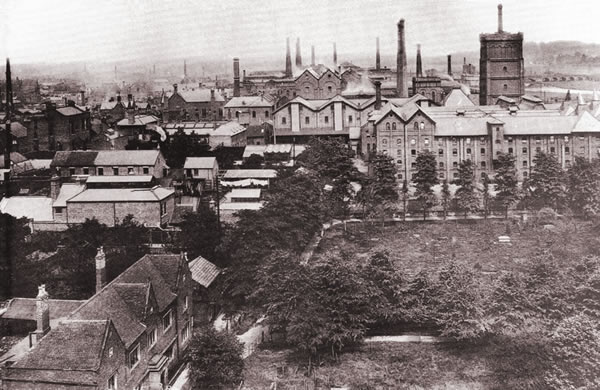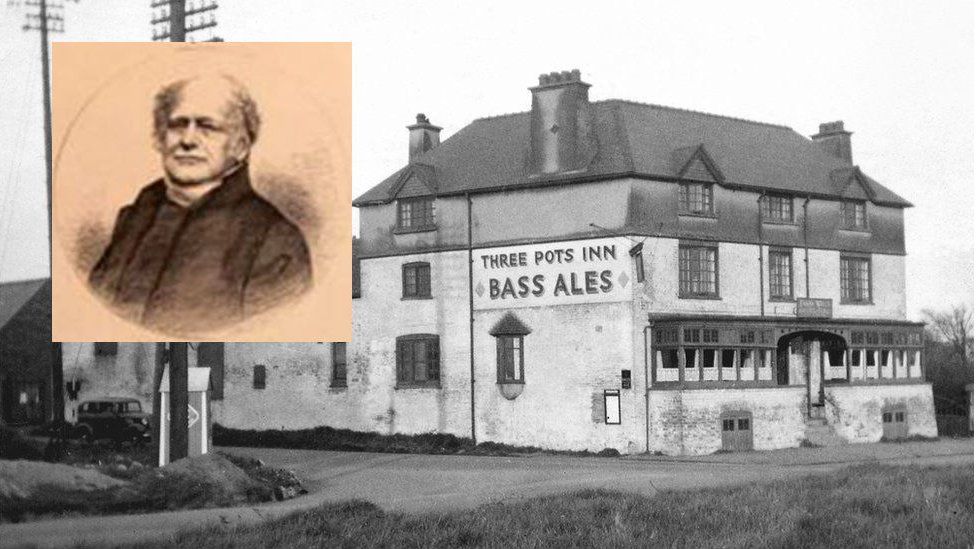![]()
Today is the birthday of William Bass (1717-March 2, 1787). Since the exact date of his birth is uncertain, in fact some sources give his birth year as 1721, the best date we have for him is when he died. For most of his life he worked as a general carrier, and moved to Burton-upon-Trent with his bride shortly after they married when he was 39, in 1756. His business increasingly involved carrying beer, and sensing an opportunity, he saved his money for many years. When he was sixty, in 1777, he founded the Bass Brewery

This is a short biography of Bass from the Local History of Burton upon Trent:
William’s father died when he was just fifteen. The eldest son, John, succeeded his father as plumber and glazier, leaving William to look after the running of the small-holding. Eventually, John and William established a carrier business and by 1754, they were operating a bi-directional service between Manchester and London but the following year, William gained complete control over the carrying business with his brother preferring to concentrate on the original established business so that he could remain in Hinckley.
In 1756, William married Mary Gibbons, the daughter of a London publican close who ran the ‘Red Lion’ close to the London depot. They chose to make their home in Burton upon Trent because it was mid-way en route from Manchester and London, was a growing industrial and commercial centre, and was positioned on the new, under construction Trunk canal.
From Burton, he carried felt hats, which had a strong manufacturing presence in Burton, together with spades, axes, screws and hardware predominantly for Thomas Thornewill’s works in New Street but also for other Burton manufacturers such as Richard Green. Increasingly, he was also shipping casks of beer from Burton’s steadily growing brewery trade for the likes of Charles Leeson, William Musgrave, Samuel Sketchley, Joseph Clay, Thomas Lovatt and Henry Evans.
Living in a modest house in Wetmore, William’s first of two sons, Michael Thomas was born in 1759. As a well established carrier proprietor, in 1765, William Bass was able to lease a large new house in High Street.
He entered brewing relatively late in life, aged 60, by selling his transportation business to the Pickford family and using the funds to purchase a Town House in High Street, with a brewery and malthouse on adjoining land, seeing brewing as providing a better future business for his two sons.
The Bass Brewery catered mainly for the domestic market, but in 1784 he started to export ale directly to the Baltic (Russia) via Hull. After his death, he was succeeded in the business by his sons William and Michael and in 1795 Michael took sole control.

This etching, from 1882, is the earliest known image showing the completed new buildings together with the original one on the left.
Here is his entry from Wikipedia:
The exact origins of William Bass, the founder of the brewery are not clear, but a scholarly account of the history of the Bass brewery shows that in the 1720s he was living with his parents, John and Ann Bass, and his two brothers, John and Thomas, in Hinckley, Leicestershire.
His father, a plumber and glazier, died when William was 15, after which he carried on a carrier business with his older brother John in Hinckley, Leicestershire. In 1756 William married Mary Gibbons, daughter of a London publican who ran the Red Lion Inn close to the London depot. They chose Burton-upon-Trent as their home because it was midway between Manchester and London, was a growing industrial-commercial centre, and was ideally positioned on the new Trunk canal, continuing his business there as a carrier of beer, his chief client being Benjamin Printon, a local brewer.
By 1777, aged 60, he had saved some money, and, seeing the growing demand for Burton beer, he entered the brewing business. He bought a town house in the High Street, which contained a brewery and malthouse on adjoining land. Burton was already a thriving brewing town with several breweries exploiting the growing export beer trade via the Trent Navigation and Hull to the Baltic ports in Russia, mainly Saint Petersburg. He established the Bass Brewery and catered mainly for the domestic market, but in 1784 he started to export ale directly to Russia.
After his death, he was succeeded in the business by his sons William and Michael, and in 1795 Michael took sole control.

The Bass Town House, as would have looked in 1834.
And here’s part of the early history of the Bass Brewery he founded:
Prior to establishing a brewery, William Bass transported ale for brewer Benjamin Printon. Bass sold this carrier business to the Pickford family, using the funds to establish Bass & Co Brewery in 1777 as one of the first breweries in Burton-upon-Trent.
Early in the company’s history, Bass was exporting bottled beer around the world, serving the Baltic region through the port of Hull. Growing demand led his son Michael Thomas Bass (senior), to build a second brewery in Burton in 1799 in partnership with John Ratcliff. The water produced from local boreholes became popular with brewers, with 30 operating there by the mid-19th century. His son, Michael Thomas Bass, succeeded on his father’s death in 1827, renewed the Ratcliff partnership, brought in John Gretton, and created ‘Bass, Ratcliff and Gretton.’

And this is from a Burton-on-Trent history website:
William Bass, born in 1717, was the second son of three sons of William Bass who ran a moderately successful plumbing and glaziery business and small-holding in Hinkley.
William’s father died when he was just fifteen. The eldest son, John, succeeded his father as plumber and glazier, leaving William to look after the running of the small-holding. Eventually, John and William established a carrier business and by 1754, they were operating a bi-directional service between Manchester and London but the following year, William gained complete control over the carrying business with his brother preferring to concentrate on the original established business so that he could remain in Hinckley.
In 1756, William married Mary Gibbons, the daughter of a London publican close who ran the ‘Red Lion’ close to the London depot. They chose to make their home in Burton upon Trent because it was mid-way en route from Manchester and London, was a growing industrial and commercial centre, and was positioned on the new, under construction Trunk canal.
From Burton, he carried felt hats, which had a strong manufacturing presence in Burton, together with spades, axes, screws and hardware predominantly for Thomas Thornewill’s works in New Street but also for other Burton manufacturers such as Richard Green. Increasingly, he was also shipping casks of beer from Burton’s steadily growing brewery trade for the likes of Charles Leeson, William Musgrave, Samuel Sketchley, Joseph Clay, Thomas Lovatt and Henry Evans.
Living in a modest house in Wetmore, William’s first of two sons, Michael Thomas was born in 1759. As a well established carrier proprietor, in 1765, William Bass was able to lease a large new house in High Street.
He entered brewing relatively late in life, aged 60, by selling his transportation business to the Pickford family and using the funds to purchase a Town House in High Street, with a brewery and malthouse on adjoining land, seeing brewing as providing a better future business for his two sons.
The Bass Brewery catered mainly for the domestic market, but in 1784 he started to export ale directly to the Baltic (Russia) via Hull. After his death, he was succeeded in the business by his sons William and Michael and in 1795 Michael took sole control.

